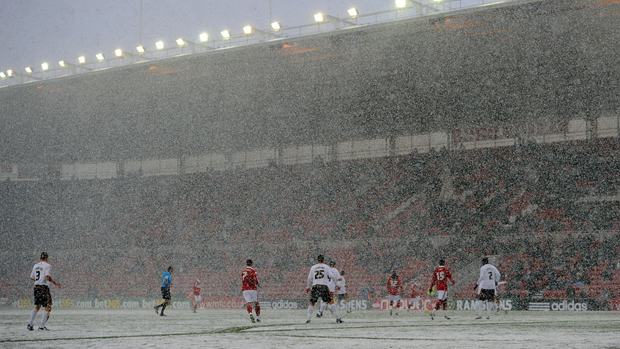How to face a frosty fixture
Get one over your shivering opponent

Our five top tips for beating the cold...
1 Set yourself goals
To focus your mind before each game and training session, set personal goals, which will distract you from the conditions. Research published in the Journal of Sports Sciences found that sportsmen with ‘personal mastery goals’ – such as ‘to get on the scoresheet, to keep a clean sheet, to man-mark an opponent out of the game’ – were far more likely to report high self-determination than those simply wanting to ‘win the game’.
2 Build a bond
The biggest motivation a player can receive often comes courtesy of that rowdy rabble of no-hopers and ringers he calls his team-mates. According to Oxford University studies, it’s often the influence of those surrounding a player that can motivate a sportsman to endure the harshest conditions. You’re more likely to stick to a routine if you make specific appointments, so arrange to pick up or meet team-mates before a game. Bonding as a team – through training, pre-match drills and matches – causes a surge in endorphins (feel-good hormones) that solo exercisers don’t experience, claim the Oxford University boffins.
Get FourFourTwo Newsletter
The best features, fun and footballing quizzes, straight to your inbox every week.
3 Acclimatise to park life
These days there’s no shame in donning a beanie hat, gloves and even Lycra leggings beneath your football kit. In fact, the experts insist that dressing the part for a cold weather kick-off can be crucial to your performance. Researchers from the School of Health and Human Performance at Australia’s Central Queensland University suggest that combining pre-match warm-ups with clothes that protect you from the extremities will not only keep the whole body more comfortable; it will also reduce your risk of muscle-related injuries during a cold start.
4 Warm up to speed
Do on-the-spot drills at home or in the changing room before heading out onto the pitch. According to research from Japan’s National Defence Medical College, cold weather causes muscles to empty their glycogen stores at five to six times the normal rate. To maintain your energy levels and prepare your body for the conditions, complete a good warm-up including dynamic stretches and body temperature-raising sprints.
5 View the bigger picture
Use thought control. Don’t dwell on the negatives such as ‘It’s too cold’ or ‘I’m going to get injured’. Researchers from the University of Hull exploring the relationship between mental toughness and sports success found that practising strategies that look to positive outcomes when faced with stresses do better in competition. Instead think, ‘I’ve come through conditions like this before unscathed’ or ‘I can get through this game and hit the warm bar afterwards.’
